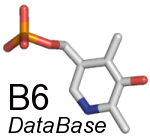|
|
| type |
Journal Article |
| authors |
Nishiyama, K.; Funai, T.; Yokota, S.; Ichiyama, A. |
| title |
ATP-dependent degradation of a mutant serine: pyruvate/alanine:glyoxylate aminotransferase in a primary hyperoxaluria type 1 case |
| journal |
J Cell Biol |
| Activity |
2.6.1.51 |
| ui |
94064784 |
| year |
(1993) |
| volume |
123 |
| number |
5 |
| pages |
1237-48. |
| | |
|---|
| keywords |
Adenosine Triphosphate/*pharmacology |
| abstract |
Primary hyperoxaluria type 1 (PH 1), an inborn error of glyoxylate metabolism characterized by excessive synthesis of oxalate and glycolate, is caused by a defect in serine:pyruvate/alanine:glyoxylate aminotransferase (SPT/AGT). This enzyme is peroxisomal in human liver. Recently, we cloned SPT/AGT-cDNA from a PH 1 case, and demonstrated a point mutation of T to C in the coding region of the SPT/AGT gene encoding a Ser to Pro substitution at residue 205 (Nishiyama, K., T. Funai, R. Katafuchi, F. Hattori, K. Onoyama, and A. Ichiyama. 1991. Biochem. Biophys. Res. Commun. 176:1093-1099). In the liver of this patient, SPT/AGT was very low with respect to not only activity but also protein detectable on Western blot and immunoprecipitation analyses. Immunocytochemically detectable SPT/AGT labeling was also low, although it was detected predominantly in peroxisomes. On the other hand, the level of translatable SPT/AGT-mRNA was higher than normal, indicating that SPT/AGT had been synthesized in the patient's liver at least as effectively as in normal liver. Rapid degradation of the mutant SPT/AGT was then demonstrated in transfected COS cells and transformed Escherichia coli, accounting for the low level of immunodetectable mutant SPT/AGT in the patient's liver. The mutant SPT/AGT was also degraded much faster than normal in an in vitro system with a rabbit reticulocyte extract, and the degradation in vitro was ATP dependent. These results indicate that a single amino acid substitution in SPT/AGT found in the PH1 case leads to a reduced half- life of this protein. It appears that the mutant SPT/AGT is recognized in cells as an abnormal protein to be eliminated by degradation. |
| last changed |
2002/11/12 16:17 |
|











